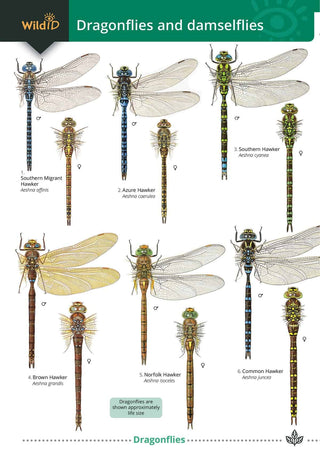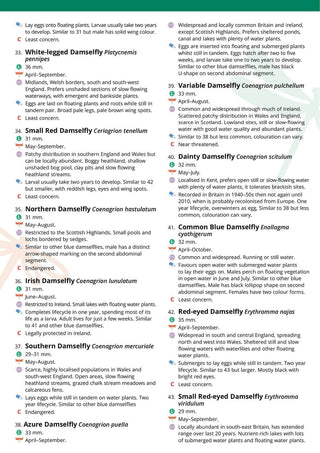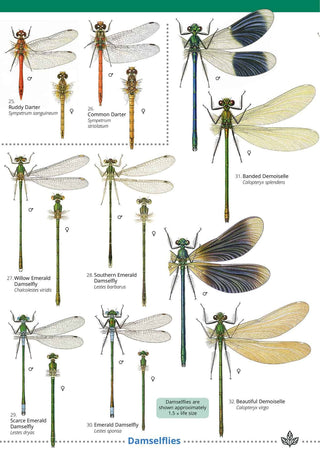Dragonflies guide
The FSC Dragonflies guide features adults of 26 dragonfly species and 20 damselfly species. This is a new edition published in 2023.
Enabling speedy dragonfly identification in the field, this guide features beautiful life-size colour paintings by Richard Lewington. Different forms for males and females feature where appropriate. The guide includes 5 additional species of vagrants.
Dragonflies and damselflies adults fly during the day, especially in the summer sunshine. Most species fly near freshwater, like rivers, ponds and lakes. With practice most species can be recognised in the field, even when in flight. Since blue damselflies are sometimes a little tricky, the guide includes close-up views of the nine similar species. The second abdominal segment is especially important for distinguishing these damselflies.
All dragonflies and damselflies have long bodies, plus two pairs of densely veined wings. These insects often brightly coloured. In general the dragonflies are large and chunky. Adult dragonflies are large insects. The biggest British species has a wing span of about 10 cm, and a body length of about 8 cm. They have huge eyes, occupying most of the globular head. They rest with their wings stretched out. In contrast damselflies are much smaller. They have a relatively weak fluttering flight, frequently resting on vegetation. When at rest they tend to fold their wings. The eyes of damselflies are also smaller and have a different position on the head.
Together dragonflies and damselflies belong to the order of insects called Odonata (meaning ‘toothed jaw’). The Odonata are a remarkable group, with about 5500 species in the world today. Although still common and widespread today, they were among the first flying insects to appear on earth. Indeed, fossils of dragonfly-like insects occur in Carboniferous rocks over 350 million years old.
Dragonflies guide
The FSC Dragonflies guide features adults of 26 dragonfly species and 20 damselfly species. This is a new edition published in 2023.
Enabling speedy dragonfly identification in the field, this guide features beautiful life-size colour paintings by Richard Lewington. Different forms for males and females feature where appropriate. The guide includes 5 additional species of vagrants.
Dragonflies and damselflies adults fly during the day, especially in the summer sunshine. Most species fly near freshwater, like rivers, ponds and lakes. With practice most species can be recognised in the field, even when in flight. Since blue damselflies are sometimes a little tricky, the guide includes close-up views of the nine similar species. The second abdominal segment is especially important for distinguishing these damselflies.
All dragonflies and damselflies have long bodies, plus two pairs of densely veined wings. These insects often brightly coloured. In general the dragonflies are large and chunky. Adult dragonflies are large insects. The biggest British species has a wing span of about 10 cm, and a body length of about 8 cm. They have huge eyes, occupying most of the globular head. They rest with their wings stretched out. In contrast damselflies are much smaller. They have a relatively weak fluttering flight, frequently resting on vegetation. When at rest they tend to fold their wings. The eyes of damselflies are also smaller and have a different position on the head.
Together dragonflies and damselflies belong to the order of insects called Odonata (meaning ‘toothed jaw’). The Odonata are a remarkable group, with about 5500 species in the world today. Although still common and widespread today, they were among the first flying insects to appear on earth. Indeed, fossils of dragonfly-like insects occur in Carboniferous rocks over 350 million years old.



